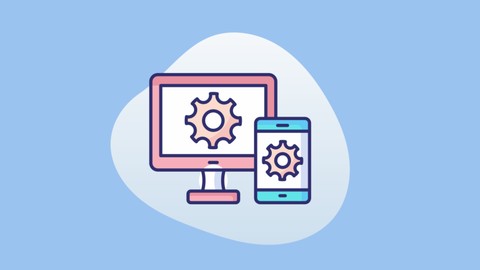
API Development Essentials: Node.js, Express, and PostgreSQL
API Development Essentials: Node.js, Express, and PostgreSQL, available at Free, with 37 lectures, and has 15 subscribers.
You will learn about Understand and explain the fundamental concepts of RESTful APIs and their importance in modern web development. Describe the principles of REST and how they apply to API design. Set up a development environment Install and configure essential tools like Postman and nodemon for API development and testing. Comprehend asynchronous programming in Nodejs and its relevance to API development. Understand and use Nodejs modules to organize and structure applications. Install and configure PostgreSQL as a relational database management system. Connect to a PostgreSQL database using the Psql Shell and execute basic commands. Install and set up Expressjs to build and manage the server-side of an application Integrate PostgreSQL with an Expressjs application using the node-postgres (pg) library. Develop and structure an Expressjs application file to initiate the server and manage routes. Create API endpoints to perform CRUD (Create, Read, Update, Delete) operations on database records. Implement GET routes to retrieve data from a PostgreSQL database. Develop POST routes to add new records to a PostgreSQL database. Implement PUT routes to update existing records in a PostgreSQL database. Create DELETE routes to remove records from a PostgreSQL database. Export and organize route functions in separate modules for better maintainability. Test the functionality of API endpoints using Postman to ensure accuracy and performance. Apply caching strategies to improve the performance of API responses. Implement security best practices to protect API endpoints against common vulnerabilities like SQL injection and Cross-Site Scripting (XSS). Understand and apply rate limiting and throttling techniques to prevent abuse and ensure scalability. Optimize API performance and security to meet industry standards and best practices. This course is ideal for individuals who are Beginner to intermediate developers who want to expand their skills in backend development and API creation. or Frontend developers looking to gain knowledge of server-side programming and API integration. or Computer science students who need practical experience in building RESTful APIs with Nodejs, Express, and PostgreSQL. or Aspiring full-stack developers who want to learn how to connect frontend applications to backend databases using RESTful APIs. or Software engineers seeking to enhance their understanding of API security, performance optimization, and best practices. or Project managers or tech leads who wish to understand the technical foundations of API development to better guide their teams. or Entrepreneurs or startup founders who need to develop basic APIs for their web or mobile applications. It is particularly useful for Beginner to intermediate developers who want to expand their skills in backend development and API creation. or Frontend developers looking to gain knowledge of server-side programming and API integration. or Computer science students who need practical experience in building RESTful APIs with Nodejs, Express, and PostgreSQL. or Aspiring full-stack developers who want to learn how to connect frontend applications to backend databases using RESTful APIs. or Software engineers seeking to enhance their understanding of API security, performance optimization, and best practices. or Project managers or tech leads who wish to understand the technical foundations of API development to better guide their teams. or Entrepreneurs or startup founders who need to develop basic APIs for their web or mobile applications.
Enroll now: API Development Essentials: Node.js, Express, and PostgreSQL
Summary
Title: API Development Essentials: Node.js, Express, and PostgreSQL
Price: Free
Number of Lectures: 37
Number of Published Lectures: 37
Number of Curriculum Items: 37
Number of Published Curriculum Objects: 37
Original Price: Free
Quality Status: approved
Status: Live
What You Will Learn
- Understand and explain the fundamental concepts of RESTful APIs and their importance in modern web development.
- Describe the principles of REST and how they apply to API design.
- Set up a development environment
- Install and configure essential tools like Postman and nodemon for API development and testing.
- Comprehend asynchronous programming in Nodejs and its relevance to API development.
- Understand and use Nodejs modules to organize and structure applications.
- Install and configure PostgreSQL as a relational database management system.
- Connect to a PostgreSQL database using the Psql Shell and execute basic commands.
- Install and set up Expressjs to build and manage the server-side of an application
- Integrate PostgreSQL with an Expressjs application using the node-postgres (pg) library.
- Develop and structure an Expressjs application file to initiate the server and manage routes.
- Create API endpoints to perform CRUD (Create, Read, Update, Delete) operations on database records.
- Implement GET routes to retrieve data from a PostgreSQL database.
- Develop POST routes to add new records to a PostgreSQL database.
- Implement PUT routes to update existing records in a PostgreSQL database.
- Create DELETE routes to remove records from a PostgreSQL database.
- Export and organize route functions in separate modules for better maintainability.
- Test the functionality of API endpoints using Postman to ensure accuracy and performance.
- Apply caching strategies to improve the performance of API responses.
- Implement security best practices to protect API endpoints against common vulnerabilities like SQL injection and Cross-Site Scripting (XSS).
- Understand and apply rate limiting and throttling techniques to prevent abuse and ensure scalability.
- Optimize API performance and security to meet industry standards and best practices.
Who Should Attend
- Beginner to intermediate developers who want to expand their skills in backend development and API creation.
- Frontend developers looking to gain knowledge of server-side programming and API integration.
- Computer science students who need practical experience in building RESTful APIs with Nodejs, Express, and PostgreSQL.
- Aspiring full-stack developers who want to learn how to connect frontend applications to backend databases using RESTful APIs.
- Software engineers seeking to enhance their understanding of API security, performance optimization, and best practices.
- Project managers or tech leads who wish to understand the technical foundations of API development to better guide their teams.
- Entrepreneurs or startup founders who need to develop basic APIs for their web or mobile applications.
Target Audiences
- Beginner to intermediate developers who want to expand their skills in backend development and API creation.
- Frontend developers looking to gain knowledge of server-side programming and API integration.
- Computer science students who need practical experience in building RESTful APIs with Nodejs, Express, and PostgreSQL.
- Aspiring full-stack developers who want to learn how to connect frontend applications to backend databases using RESTful APIs.
- Software engineers seeking to enhance their understanding of API security, performance optimization, and best practices.
- Project managers or tech leads who wish to understand the technical foundations of API development to better guide their teams.
- Entrepreneurs or startup founders who need to develop basic APIs for their web or mobile applications.
In today’s digital world, APIs (Application Programming Interfaces) are the backbone of modern web and mobile applications. They enable seamless communication between different software components, allowing for the integration of services, data sharing, and the creation of dynamic and interactive user experiences. Whether you’re a frontend developer looking to expand your skill set, a backend developer aiming to master API creation, or an aspiring full-stack developer, understanding how to build and manage APIs is essential. This course, “API Development Essentials: Node.js, Express, and PostgreSQL,” is designed to equip you with the knowledge and skills you need to design, build, and optimize RESTful APIs using some of the most powerful and widely-used technologies in the industry.
What You Will Learn:
The course begins with an introduction to the core concepts of APIs and REST (Representational State Transfer). You’ll explore what an API is, how it functions, and why RESTful APIs have become a standard for building scalable and maintainable applications. The principles of REST, such as statelessness, resource-based architecture, and proper use of HTTP methods, will be covered in detail, providing a solid foundation for your API development journey.
Next, you’ll set up your development environment, starting with Node.js, a powerful JavaScript runtime that allows you to build server-side applications with ease. You’ll learn how to install Node.js and npm (Node Package Manager), explore the basics of asynchronous programming in Node.js, and understand how to work with Node.js modules to structure your applications effectively. The course will also guide you through the installation of essential tools like Visual Studio Code, a popular code editor, Postman, a tool for testing APIs, and nodemon, a utility that helps manage your development workflow by automatically restarting the server when code changes.
With your development environment ready, you’ll dive into database management with PostgreSQL, a powerful, open-source relational database system. You’ll learn how to install PostgreSQL, connect to it using the Psql Shell, create roles (user accounts), and manage databases and tables. This section will also cover basic SQL operations such as inserting, updating, and deleting data, setting the stage for integrating your database with a Node.js application.
The heart of the course lies in building an Express.js server and connecting it to your PostgreSQL database. Express.js is a flexible and minimal web application framework for Node.js, making it easier to create robust APIs. You’ll install Express.js and the node-postgres (pg) library, which allows Node.js to interact with PostgreSQL. You’ll then create an application file, start the Express server, and connect it to your database.
Once your server is up and running, you’ll move on to implementing CRUD (Create, Read, Update, Delete) operations. You’ll create API endpoints to perform these operations on your PostgreSQL database, learning how to structure your routes and organize your code for scalability and maintainability. Testing the functionality of your API using Postman will ensure that your endpoints are working correctly and efficiently.
Beyond the basics, this course will also cover performance optimization and security best practices. You’ll learn caching strategies to improve the responsiveness of your APIs, and you’ll implement security measures to protect your endpoints from common vulnerabilities such as SQL injection, Cross-Site Scripting (XSS), and Cross-Site Request Forgery (CSRF). Additionally, you’ll explore rate limiting and throttling techniques to prevent abuse and ensure your API can handle high traffic loads.
Who This Course Is For:
This course is ideal for anyone who wants to gain practical experience in building RESTful APIs using Node.js, Express, and PostgreSQL. Whether you’re a beginner eager to dive into backend development or an experienced developer looking to enhance your skills, this course provides a comprehensive and hands-on learning experience. By the end of this course, you’ll have the confidence to build and deploy your own APIs, integrate them with front-end applications, and optimize them for performance and security.
Join us in “API Development Essentials: Node.js, Express, and PostgreSQL,” and take your development skills to the next level.
Course Curriculum
Chapter 1: Introduction to RESTful APIs
Lecture 1: Introduction
Lecture 2: Overview of APIs (Application Programming Interfaces)
Lecture 3: What is REST?
Lecture 4: Principles of RESTful APIs
Chapter 2: Setting Up Your Development Environment
Lecture 1: Introduction to Node.js
Lecture 2: Installing Node.js and npm
Lecture 3: Asynchronous Programming in Node.js
Lecture 4: Understanding Node.js Modules
Lecture 5: Introduction to text editors
Lecture 6: Installing Visual Studio Code
Lecture 7: Installing Postman
Lecture 8: Installing nodemon
Chapter 3: Database Setup
Lecture 1: Introduction to PostgreSQL
Lecture 2: Installing PostgreSQL
Lecture 3: Connecting to database from Psql Shell
Lecture 4: Creating a new role ( user account) on PostgresQL
Lecture 5: Create a new database
Lecture 6: Create a table
Lecture 7: Inserting Data into database
Chapter 4: Building an Express Server
Lecture 1: Introduction to Express.js
Lecture 2: Installing Express.js
Lecture 3: Installing node-postgres (pg)
Lecture 4: Creating application file
Lecture 5: Starting Express Server
Lecture 6: Connecting to database from Node.js
Chapter 5: Creating API Endpoints: Implementing CRUD Operations
Lecture 1: Create Route to Get all data from database table
Lecture 2: Create Route to Get a single record from database table
Lecture 3: Create Route to Add a new record to database table
Lecture 4: Create Route to UPDATE a single record from database table
Lecture 5: Create Route to DELETE a record from database table
Lecture 6: Exporting Route Functions
Lecture 7: Creating endponts for Route Functions
Lecture 8: Testing API Functionality with Postman
Lecture 9: Project Code
Chapter 6: Performance Optimization and Security Best Practices
Lecture 1: Caching Strategies
Lecture 2: Securing API Endpoints Against Common Vulnerabilities
Lecture 3: Rate Limiting and Throttling
Instructors
-
247 Learning
An investment in knowledge pays the best interest
Rating Distribution
- 1 stars: 0 votes
- 2 stars: 0 votes
- 3 stars: 0 votes
- 4 stars: 0 votes
- 5 stars: 0 votes
Frequently Asked Questions
How long do I have access to the course materials?
You can view and review the lecture materials indefinitely, like an on-demand channel.
Can I take my courses with me wherever I go?
Definitely! If you have an internet connection, courses on Udemy are available on any device at any time. If you don’t have an internet connection, some instructors also let their students download course lectures. That’s up to the instructor though, so make sure you get on their good side!
You may also like
- Top 10 Content Creation Courses to Learn in December 2024
- Top 10 Game Development Courses to Learn in December 2024
- Top 10 Software Testing Courses to Learn in December 2024
- Top 10 Big Data Courses to Learn in December 2024
- Top 10 Internet Of Things Courses to Learn in December 2024
- Top 10 Quantum Computing Courses to Learn in December 2024
- Top 10 Cloud Computing Courses to Learn in December 2024
- Top 10 3d Modeling Courses to Learn in December 2024
- Top 10 Mobile App Development Courses to Learn in December 2024
- Top 10 Graphic Design Courses to Learn in December 2024
- Top 10 Videography Courses to Learn in December 2024
- Top 10 Photography Courses to Learn in December 2024
- Top 10 Language Learning Courses to Learn in December 2024
- Top 10 Product Management Courses to Learn in December 2024
- Top 10 Investing Courses to Learn in December 2024
- Top 10 Personal Finance Courses to Learn in December 2024
- Top 10 Health And Wellness Courses to Learn in December 2024
- Top 10 Chatgpt And Ai Tools Courses to Learn in December 2024
- Top 10 Virtual Reality Courses to Learn in December 2024
- Top 10 Augmented Reality Courses to Learn in December 2024






















